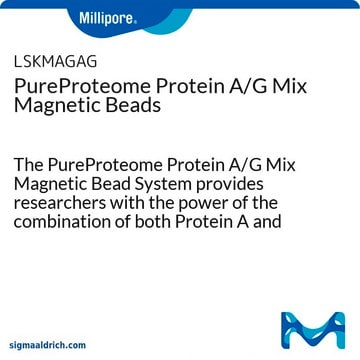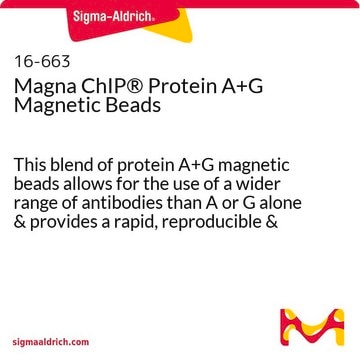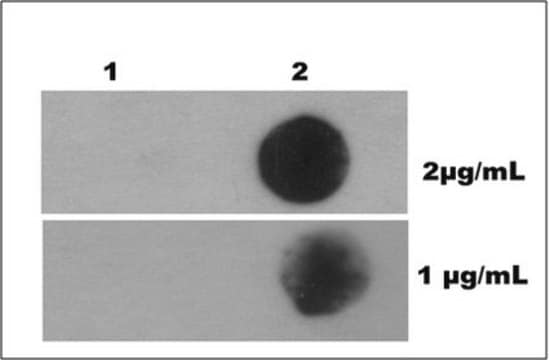17-700
Magna RIP® RNA-Binding Protein Immunoprecipitation Kit
RNA Immunoprecipitation (RIP) Kit containing all necessary reagents to perform 12 individual RNA-binding protein immunoprecipitation (RIP) reactions using protein A/G magnetic beads.
Synonym(s):
Magnetic Bead RNA Immunoprecipitation, Magnetic RIP kit, RIP Kit, RNA Immunopreciptation
Sign Into View Organizational & Contract Pricing
All Photos(2)
About This Item
UNSPSC Code:
12161503
eCl@ss:
32161000
NACRES:
NA.32
Recommended Products
Quality Level
manufacturer/tradename
Magna RIP®
Upstate®
technique(s)
RIP: suitable
immunoprecipitation (IP): suitable
shipped in
dry ice
Related Categories
General description
Gene regulation plays a critical role in complex cellular processes such as development, differentiation, and cellular response to environmental changes. In addition to transcriptional regulation of gene expression by transcription factors, cells utilize post-transcriptional regulatory mechanisms. One such mechanism involves use of certain RNA-binding proteins (RBPs) to temporally and coordinately regulate the rate of mRNA translation of functionally related gene
products. While the regulation of gene expression by transcription factors has been well studied over time, the post-transcriptional regulation of mRNAs by RBPs and the role of non-coding RNAs in this process is a relatively nascent field that remains to be thoroughly explored.
products. While the regulation of gene expression by transcription factors has been well studied over time, the post-transcriptional regulation of mRNAs by RBPs and the role of non-coding RNAs in this process is a relatively nascent field that remains to be thoroughly explored.
RNA-binding protein immunoprecipitation (RIP) is the RNA analog of the more well-known ChIP application (chromatin immunoprecipitation), which identifies DNA targets of DNA-binding proteins in an in-vivo cellular context. RIP can be used to identify specific RNA molecules (of many types) associated with specific nuclear or cytoplasmic binding proteins. These experiments involve immunoprecipitation of endogenously formed complexes of RNA-binding proteins and co-isolation of any RNA species associated with that RNA-binding protein. Purification of these RNA species allows interrogation and identification of mRNAs (and potentially non-coding RNAs associated with them) and can be directly measured using down stream applications including quantitative reverse transcription polymerase chain reaction (RT-PCR), microarray analysis (RIP-chip) and “deep-sequencing” or 2nd-generation sequencing based platforms (RIP-Seq).
Features & Benefits:
-Protein A/G magnetic beads, optimized to bind nucleic acid-protein immune complexes
-RNAse inhibitors and RNAse-free reagents
-Negative controls
Features & Benefits:
-Protein A/G magnetic beads, optimized to bind nucleic acid-protein immune complexes
-RNAse inhibitors and RNAse-free reagents
-Negative controls
Application
Research Category
Epigenetics & Nuclear Function
Epigenetics & Nuclear Function
Packaging
RIP Kit capacity: 12 RNA-binding protein immunoprecipitation assays
Components
Magnetic Beads Protein A/G
RIP Wash Buffer
RIP Lysis Buffer
0.5 M EDTA
10% SDS
Salt Solution I
Salt Solution II
Precipitate Enhancer
Normal Mouse IgG
Rabbit IgG Purified
Protease Inhibitor Cocktail 200X
RNase Inhibitor
Proteinase K (10 mg/mL)
Nuclease free water
RIP Wash Buffer
RIP Lysis Buffer
0.5 M EDTA
10% SDS
Salt Solution I
Salt Solution II
Precipitate Enhancer
Normal Mouse IgG
Rabbit IgG Purified
Protease Inhibitor Cocktail 200X
RNase Inhibitor
Proteinase K (10 mg/mL)
Nuclease free water
Physical form
Two boxes containing all necessary reagents to perform 12 individual RNA-binding protein immunoprecipitation (RIP) reactions.
Storage and Stability
Upon receipt, store components at the temperatures indicated on the labels. Kit components are stable for 6 months from date of shipment when stored as directed.
Legal Information
MAGNA RIP is a registered trademark of Merck KGaA, Darmstadt, Germany
UPSTATE is a registered trademark of Merck KGaA, Darmstadt, Germany
Disclaimer
Unless otherwise stated in our catalog or other company documentation accompanying the product(s), our products are intended for research use only and are not to be used for any other purpose, which includes but is not limited to, unauthorized commercial uses, in vitro diagnostic uses, ex vivo or in vivo therapeutic uses or any type of consumption or application to humans or animals.
Signal Word
Warning
Hazard Statements
Precautionary Statements
Hazard Classifications
Acute Tox. 4 Oral - Aquatic Chronic 3 - Eye Irrit. 2 - Skin Irrit. 2
Storage Class Code
10 - Combustible liquids
Certificates of Analysis (COA)
Search for Certificates of Analysis (COA) by entering the products Lot/Batch Number. Lot and Batch Numbers can be found on a product’s label following the words ‘Lot’ or ‘Batch’.
Already Own This Product?
Find documentation for the products that you have recently purchased in the Document Library.
Customers Also Viewed
Cold-inducible RNA-binding protein (CIRP) regulates target mRNA stabilization in the mouse testis.
Xia, Z; Zheng, X; Zheng, H; Liu, X; Yang, Z; Wang, X
Febs Letters null
Cloning of the quail PIWI gene and characterization of PIWI binding to small RNAs.
Chen, R; Chang, G; Zhang, Y; Dai, A; Ma, T; Li, J; Zhai, F; Hua, D; Xia, M; Chen, G
Testing null
RNA processing and modification protein, carbon catabolite repression 4 (Ccr4), arrests the cell cycle through p21-dependent and p53-independent pathway.
Yi, X; Hong, M; Gui, B; Chen, Z; Li, L; Xie, G; Liang, J; Wang, X; Shang, Y
The Journal of Biological Chemistry null
Ubiquitination and deubiquitination of NP protein regulates influenza A virus RNA replication.
Liao, TL; Wu, CY; Su, WC; Jeng, KS; Lai, MM
The Embo Journal null
Ling Zhang et al.
Carcinogenesis, 34(3), 577-586 (2012-12-12)
Although numerous long non-coding RNAs (lncRNAs) have been identified in mammals, many of their biological roles remain to be characterized. Early reports suggest that H19 contributes to carcinogenesis, including hepatocellular carcinoma (HCC). Examination of the Oncomine resource showed that most
Our team of scientists has experience in all areas of research including Life Science, Material Science, Chemical Synthesis, Chromatography, Analytical and many others.
Contact Technical Service














